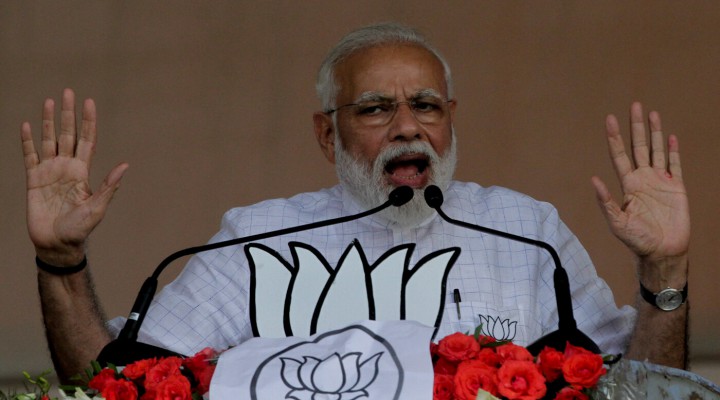Modi Delivers Ironic “Peace Day” Message Netanyahu Borrowed from Hitler
- Whitney Webb
- Monday 22 Apr 19
- 1402
- 1

Modi’s speech regarding how only the “strong” are to be respected, while issuing an implicit threat of using nuclear weapons against enemies of the state, is strikingly similar to a speech given by Israel’s Prime Minister Benjamin Netanyahu — an ally of Modi — last September.
As India’s election season drags on and nears its conclusion, current Indian Prime Minister Narendra Modi has continued to use speeches on the campaign trail to threaten using nuclear bombs against neighboring Pakistan in an attempt to portray himself as tough on “terrorism.”
In a speech delivered last Wednesday that was widely overlooked by international media, Modi used extreme rhetoric that threatens to raise already heightened tensions between India and Pakistan — both of which are nuclear powers that nearly went to war in late February. Modi stated:
Earlier, terrorists from Pakistan would come here and go back after conducting an attack. Pakistan would threaten us, saying it has the nuclear bomb and will press the button [if India retaliated]. We have the mother of nuclear bombs. I decided to tell them, do whatever you want to do but we will retaliate.”
“In the past our people would weep, go around the world saying Pakistan did this, did that … It is now Pakistan’s turn to weep,” Modi added, in an apparent suggestion that the “new India” Modi hopes to create if re-elected would take aggressive action against its northern neighbor.
Modi then alluded to the potential for an attack on Pakistan using Indian ground forces:
“Didn’t our jawans [soldiers] kill them by entering their houses? Shall we not kill them by entering their houses? Shall we not take revenge for our martyred soldiers?” His rhetorical questions about “taking revenge” in civilian homes was met with resounding yells of approval from supporters.
India’s prime minister continued by noting that he was speaking on India’s national day of peace, known as Mahavir Jayanti, but apparently oblivious to the irony between the holiday and the bellicose content of his speech:
Today is Mahavir Jayanti, the day to observe peace. But when shall we have peace? Will anyone listen to a weak man making an appeal for peace or to the warning of a strong man who can flex his muscles? Only the peace appeal of a strong man will be respected, not that of a weak person.”
From Netanyahu’s copy of Hitler’s playbook
Modi’s speech regarding how only the “strong” are to be respected, while issuing an implicit threat of using nuclear weapons against enemies of the state, is strikingly similar to a speech given by Israel’s Prime Minister Benjamin Netanyahu — an ally of Modi — last September. Speaking in front of Israel’s Dimona nuclear plant, long believed to house Israel’s not-so-secret nuclear weapons program, Netanyahu had stated:
The weak crumble, are slaughtered and are erased from history while the strong, for good or for ill, survive. The strong are respected, and alliances are made with the strong, and in the end, peace is made with the strong…But our enemies know very well what Israel is capable of doing. They are familiar with our policy. Whoever tries to hurt us — we hurt them.”
During that speech, Netanyahu had also threatened that Israel would hit Iranian forces present in Syria with “all its might.” Some commentators at the time condemned the speech as fascist and noted the similarity of Netanyahu’s rhetoric to an infamous speech given by Adolf Hitler in 1923, where the soon-to-be Nazi leader had stated: “The whole of nature is a mighty struggle between strength and weakness, an eternal victory of the strong over the weak.”
Unsurprisingly, Netanyahu’s government has been a major backer of Modi’s harsh rhetoric towards Pakistan and of his brand of Hindu nationalism, which mirrors Netanyahu’s own Jewish nationalism (i.e., Zionism). Their relationship has been further cemented by Israel’s key role in supplying India’s military with weapons — with India now representing nearly half of Israel’s arms export market — and also training “elite” Indian military officers.
Another factor that has emerged recently has been the increase in cooperation of both India’s and Israel’s chief geopolitical foes, Pakistan and Iran respectively. On Monday, Pakistan and Iran announced that they would be forming a joint security force to patrol their mutual border. Though thwarting armed terrorist groups is the official reason for the force’s formation, some have noted that its formation coincides with the discovery of massive oil reserves along the Iran-Pakistan border and Iran’s public promise to supply oil and gas to Pakistan as it faces a U.S.-imposed oil embargo.
With Israel and India moving closer together just as their foes increase their cooperation — and with the aggressive rhetoric and rising tensions among these countries, three of which have nuclear weapons — the potential and very real danger of a nuclear war must be treated with the utmost seriousness and not the near media black-out that has instead ensued.
Modi Delivers Ironic “Peace Day” Message Netanyahu Borrowed from Hitler

Whitney Webb
Whitney Webb is a MintPress News journalist based in Chile. She has contributed to several independent media outlets including Global Research, EcoWatch, the Ron Paul Institute and 21st Century Wire, among others. She has made several radio and television appearances and is the 2019 winner of the Serena Shim Award for Uncompromised Integrity in Journalism.
 TheAltWorld
TheAltWorld
Alisha Ross
Thanks for your great information ..But
Modi is my favourite leader . And his body language and speeching quality is incredible.